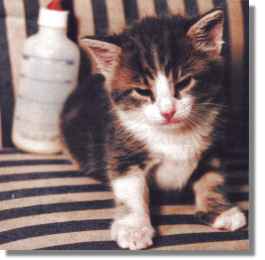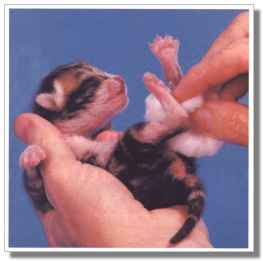baru2 ni (read: semalam) ade amek anak kucing kat rumah lame tp xde ibunyalah so kami pu cube la nk nurse kucing tu. nasib baik la Luna n Lucky 2 da besar ckit so die da boleh makan la makanan yg lembut tu.
btw, ni ader sedikit info untuk menjaga anak kucing yg xde ibu.
| When gazing at a helpless wad of fur, we can understand Prissys dilemma in Gone With the Wind. We don't "know nothin' 'bout" nursing feline babies, either. They may have been left motherless for countless reasons. The queen may have been hit by a car or trapped somewhere. Or she may simply be unable to nurse them due to a caesarian section or an illness.But don't despair. You're perfectly able to take care of these poor little kittens. Your first priority is to keep the kittens warm, says Carie Johnston, DVM, who has 16 years of experience in bottle-feeding kitten orphans. She stresses that because kittens cannot shiver for their first seven to 10 days of life, warmth is a kitten's most immediate need, more critical even than food. | |||||||
 You can make a warm nursery by placing a box halfway on a heating pad. Cover the nesting area with a towel or a light blanket. This should maintain the kittens' body temperatures at 101° F to 102° F without getting them too hot. If you put the pad inside the box, make sure the kittens cannot crawl under the towel or come in direct contact with the pad. The box should be large enough for the kittens to crawl off the pad if they become too warm. Monitor the heat closely. If possible, use a heating pad designed for animals, as pads for humans can get dangerously hot.Don't let your other pets visit the kittens. While these little cuties may look harmless, they could expose your own cats to a host of contagious diseases. Also, since the kittens aren't getting mom's antibodies from her milk, they are vulnerable to diseases that your pets may be carrying. You can make a warm nursery by placing a box halfway on a heating pad. Cover the nesting area with a towel or a light blanket. This should maintain the kittens' body temperatures at 101° F to 102° F without getting them too hot. If you put the pad inside the box, make sure the kittens cannot crawl under the towel or come in direct contact with the pad. The box should be large enough for the kittens to crawl off the pad if they become too warm. Monitor the heat closely. If possible, use a heating pad designed for animals, as pads for humans can get dangerously hot.Don't let your other pets visit the kittens. While these little cuties may look harmless, they could expose your own cats to a host of contagious diseases. Also, since the kittens aren't getting mom's antibodies from her milk, they are vulnerable to diseases that your pets may be carrying.Many orphans are crawling with fleas; the safest way to remove them is with a flea comb. When you are done handling the kittens, always wash your hands. Now it's dinnertime. Don't grab a bottle of whole milk. That's a prescription for diarrhea. Buy a special kitten formula and nurser at a veterinary clinic or pet supply store. Kitten formula comes in a ready-to-use liquid or a powder. The liquids are much easier to use, but if you are feeding an entire litter over a five-week period, they can be expensive. Powdered formulas are a much better value and have a longer shelf life. Have your veterinarian check the kittens for dehydration and evaluate their overall condition. While you're there, ask her to show you how to feed your little charges. If they are too weak, the vet may have to place a special feeding tube directly into their stomachs. Don't try this yourself unless your veterinarian has instructed you clearly in how to do it. Improperly done, the tube could slide down the trachea and send the formula straight into the lungs, drowning the kitten. The hardest part of bottle- feeding is punching a hole in the bottles nipple. If the hole is too large, the formula can flow too fast, choking the kittens. But if it's too small, they won't be able to drink it. Once you've made the hole, test it yourself. When you're satisfied with the flow rate, you can feed the babies. Rest a kitten on his stomach (never his back), and insert the nipple into his mouth. Slowly pull up and forward on the bottle so that he will nurse with his head extended and slightly elevated. Watch the level of the formula: if the level remains constant, either the nipple is blocked or the hole is too small. Make sure that the neck of the bottle remains filled with milk so the kitten isn't sucking air. Formula spewing out of the kitten's nose means the hole is too big. If this happens, hold the kitten upside down until he stops coughing. Most kittens have an automatic cut-off valve, and the nipple will usually pop right out of their mouth when they are full. However, as a guide, feed each kitten two tablespoons of formula daily for every four ounces of weight. Very small kittens should eat every four hours. Like human babies, they will let you know when they are hungry. After he's done, place the kitten against your shoulder, and, like a human baby, gently pat him until he burps. But your motherly duties are not quite finished yet.
http://www.acfacat.com/orphan_kittens.htm | |||||||



0 comments:
Post a Comment